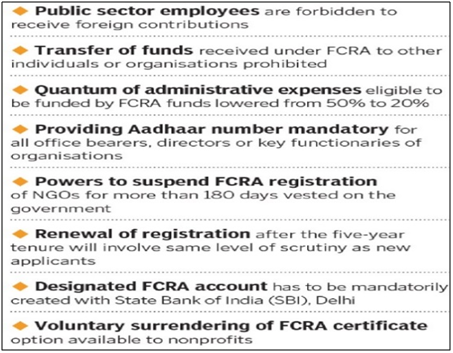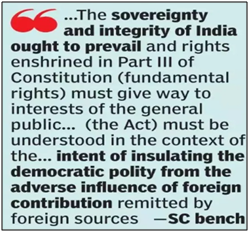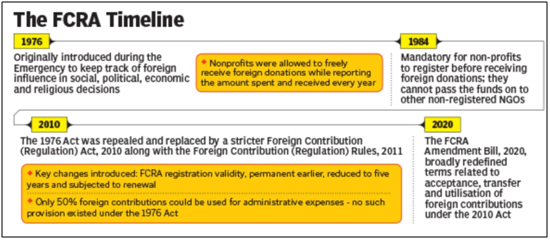In News:
- The Supreme Court of India has upheld the 2020 amendments in Foreign Contribution (Regulation) Act.
What’s in Today’s Article:
- The Foreign Contribution (Regulation) Act (FCRA), 2010– About, timeline, 2020 amendments
- Background
- News Summary
In Focus: The Foreign Contribution (Regulation) Act (FCRA), 2010 and 2020 amendment
About:
- The FCRA regulates foreign contributions/donations and ensures that such contributions do not adversely affect internal security.
- It is mandatory for all such NGOs to register themselves under the FCRA.
- Registered associations can receive foreign contribution for following purposes:
- social, educational, religious, economic, and cultural.
Timeline of evolution:
2020 Amendment
- Prohibition to accept foreign contribution
- Under the Act, certain persons are prohibited to accept any foreign contribution.
- The 2020 amendment added public servants (as defined under the Indian Penal Code) to this list.
- Transfer of foreign contribution
- The 2020 amendment prohibited the transfer of foreign contribution to any otherperson.
- Aadhaar for registration
- 2020 amendment mandated that any person seeking prior permission, registration or renewal of registration must provide the Aadhaar number.
- In case of a foreigner, they must provide a copy of the passport or the Overseas Citizen of India card for identification.
- FCRA account
- 2020 amendment stipulated that foreign contribution must be received only in an account designated by the bank as “FCRA account” in such branch of the State Bank of India, New Delhi, as notified by the central government.
- Renewal of license:
- The 2020 amendment provides that the government may conduct an inquiry before renewing the certificate.
- Use of foreign contribution for administrative purposes
- Under the Act, a person who receives foreign contribution must not use more than 50% of this contribution for meeting administrative expenses.
- 2020 amendment reduced this limit to 20%.
- Suspension of registration
- Under the 2010 Act, the government may suspend the registration of a person for a period not exceeding 180 days.
- 2020 amendment added that such suspension may be extended up to an additional 180 days.

Background:
- In 2020, the Foreign Contribution (Regulation) Act (FCRA), 2010 was amended to restrict misuse and diversion of foreign funds, and to infuse more accountability in the functioning of NGOs.
- The amendments were challenged as arbitrary and stringent and making the functioning of NGOs extremely difficult.
News Summary
- The Supreme Court has upheld the 2020 amendments made to the Foreign Contribution (Regulation) Act 2010.
- These amendments had introduced restrictions in the handling of foreign contributions by organizations in India.

Key Highlights of the Judgement
- Amendments necessary to strengthen the compliance mechanism
- The verdict noted that many NGOs, which received the funds, did not utilise the foreign funds for the purposes for which they were registered.
- It further noted that there had been cases of successive transfers and creation of a layered trail of money. This makes it difficult to trace the flow and final utilisation.
- Hence, the court observed that this amendment had been necessitated to safeguard the sovereignty and integrity of the country, and public order.
- Increase in inflow of foreign contribution
- The court noticed that the inflow of foreign contribution had almost doubled between the years 2010 and 2019.
- It further said that many of the registered associations had failed to comply with basic statutory 130 formalities.
- Thisresulted in cancellation of certificates of registration of more than 19,000 organisations.
- Read down Section 12A of the amended act
- The apex court read down Section 12A which made it mandatory for all office-bearers of NGOs to provide Aadhaar number.
- The verdict held that producing Indian Passport for the purpose of their identification would be enough.
- A country can even completely prohibit acceptance of foreign donations
- The court said a country can even completely prohibit acceptance of foreign donations.
- This can be done on the ground that it undermines the constitutional morality of the nation.












